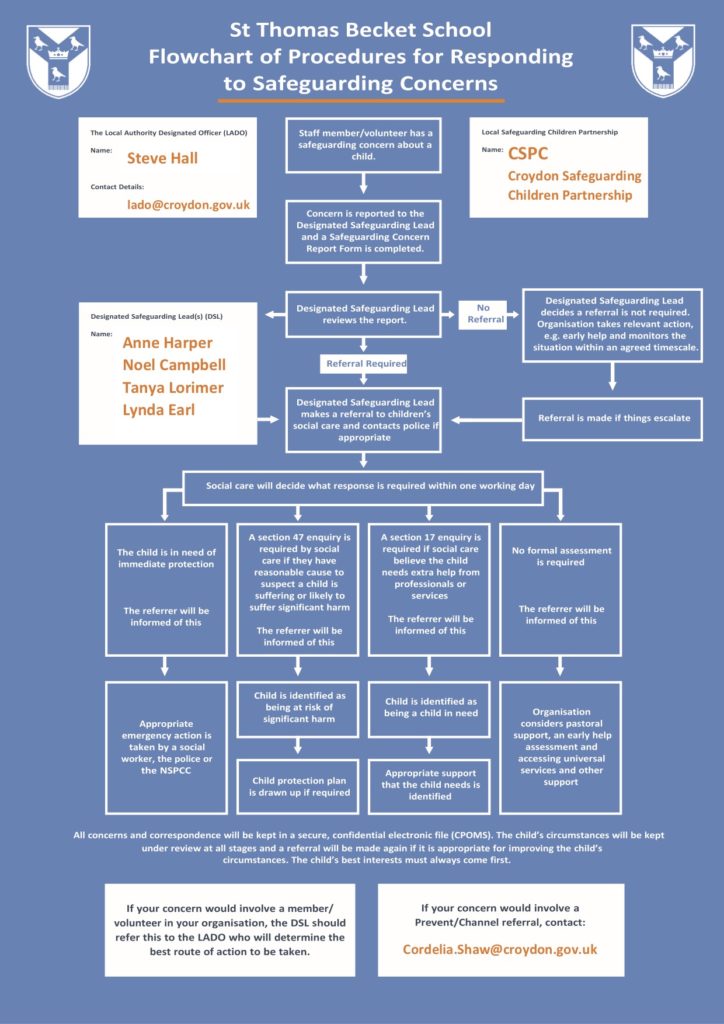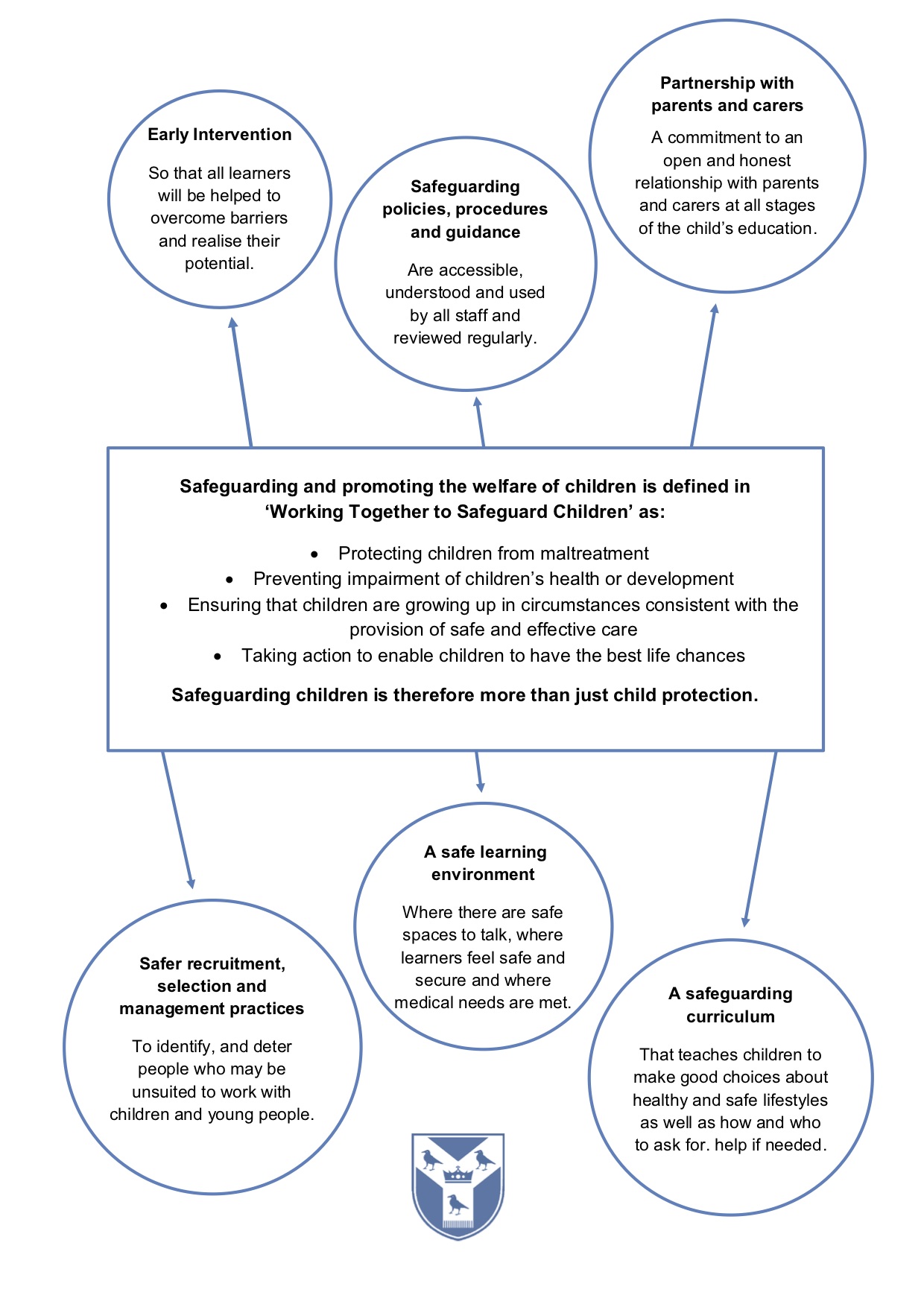Policies and Procedures
The school will work to the following policy documents in order to support the protection of pupils who are at risk of significant harm:
Working together to safeguard children (DfE 2018)
What to do if you’re worried a child is being abused (DfE 2015)
The London Safeguarding Children Board child protection procedures
Keeping children safe in education (DfE 2021)
Croydon Safeguarding Board local policies and procedures
Our school Safeguarding Policy can be found here, which underpins other policies and guidance in our school, including:
- School Complaints Policy
- Volunteer Policy
- Whistleblowing Policy
- Health and Safety Policy
- Online Safety Policy
- Policy for Educational Visits
- Care and Supervision of Children Policy
- Mobile Phone Policy
- Supporting Children with Medical Needs Policy
- Home School Agreement
- Behaviour Policy
- Intimate Care Policy
- CCTV Policy
- Equality Plan
- Attendance Policy
- Food Allergies Policy
- Safe Drop Off and Collection Policy
Flow Diagram for actions to be followed when a child discloses a safeguarding concern:

If a pupil discloses to a member of staff that they are being abused, the member of
staff should:
- listen to what is said without displaying shock or disbelief and accept what the
child is saying; - allow the child to talk freely;
- reassure the child but not make promises that it may not be possible to keep, or promise confidentiality, as a referral may have to be made to children’s social care;
- reassure the child that what has happened is not their fault and that they were right to tell someone;
- not ask direct questions but allow the child to tell their story;
- not criticise the alleged perpetrator;
- explain what will happen next and who has to be told;
DO NOT DELAY
- Tell the Designated Safeguarding Lead or deputy DSL as soon as you can.
- At the earliest opportunity make a written record of your concerns, these can be recorded directly to CPOMS or handwritten - record facts accurately and do not express opinion - these notes will help to ensure accuracy in recalling events later. Handwritten notes should be legible, signed and dated/time.
- These can be uploaded to CPOMS when the concern is logged. https://stthomasbecket.cpoms.net/
- Do not take photographs of any physical injuries, record on a body map if necessary. Do not use audio to record disclosures.
Designated Safeguarding Lead (DSL)
Anne Harper
Deputy Designated Safeguarding Leads
Diarmuid Skehan
Lynda Earl
Tanya Lorimer
Nominated Governor for Safeguarding
Mark Humphreys
We follow the UK Government Keeping Children Safe in Education Guidance (September 2021). Please click here to download a copy.
At St Thomas Becket Catholic Primary School the welfare of all children is of paramount importance. We recognise that:
- All children, regardless of age, disability, gender, racial heritage, religious beliefs, sexual orientation or identify have the right to equal protection from all types of harm or abuse.
- Working in partnership with children, young people and their parents, carers and other agencies, is essential in promoting young people’s welfare.
The child’s welfare is paramount (Children Act 1989). Adults working in our school are responsible for their own actions and behaviour and should avoid any conduct that would lead a reasonable person to question their motive or intentions. All adults working in both schools must work and be seen to work with openness and transparency.
We will seek to safeguard children and young people by:
- Valuing, listening and respecting them
- Adopting child protection guidelines through procedures and a code of conduct for staff and volunteers.
- Recruiting staff and volunteers safely, ensuring all the necessary checks are made.
- Sharing information about child protection and good practice with children, parents, staff and volunteers.
- Sharing information about concerns with agencies who need to know and involving parents and children appropriately.
- Provide effective management for staff and volunteers through supervision, support and training.
All staff, volunteers, and regular visitors from external agencies to the school (including supply staff) must be familiar with and work in accordance to the school’s policies for:
- Health and Safety
- Child Protection
- Internet Safety
- Behaviour
- Anti Bullying
- Photographing and Videoing Permissions
- Whistleblowing
- Staff Code of Conduct
All staff must provide a good example and a positive role model to pupils. All staff must:
- Behave in a mature, respectful, safe, fair and considered manner.
- Ensure that you are not sarcastic and do not make jokes to pupils of personal, sexual, racist, discriminatory, intimidating or otherwise offensive nature.
- Not embarrass or humiliate children.
- Not discriminate favourably or unfavourably towards any child. (e.g. treat all pupils equally – never build ‘special’ relationships)
- Ensure that their relationship with the pupil remains on a professional footing at all times.
All staff members must:
- Treat all children and young people with respect.
- Provide an example of good conduct you wish others to follow
- Respect a young person’s right to personal privacy.
- Encourage children and adults to feel comfortable and caring enough to point out attitudes or behaviour they do not like.
- Remember that someone else may misinterpret your actions no matter how well intentioned.
- Be aware of physical contact with a child or young person that may be misinterpreted.
- Challenge unacceptable behaviour and report all allegations/suspicions of abuse.
Click HERE to download a copy of our Staff Code of Conduct Policy.
We follow the UK Government Working Together to Safeguard Children (July 2018) guidance. To download a copy, please click here.
This guidance states that the following process must be followed if the allegation within the scope of the statutory guidance meets the harms threshold and an adult has:
- Behaved in a way that has, or may have harmed a child
- Possibly committed a criminal offence against/related to a child
- Behaved towards a child or children in a way which indicates s/he would pose a risk of harm if they work regularly or closely with children
- Behaved or may have behaved in a way that indicates they may not be suitable to work with children
When an allegation or concern is made against a member of staff or volunteer relating to a person’s conduct towards a child, the following process must be followed:
The allegation or concern must immediately be reported to the Headteacher or, in their absence, the Deputy Head Teacher.
If the allegation or concern fits within the scope of the guidance, the Headteacher must report the matter to the Local Authority Designated Officer (LADO) within the same working day.
The LADO will discuss the matter with the Headteacher in order to decide which process should be followed. Where it is believed that the allegation falls within the scope of guidance, there are three possible strands to enquiries that may be initiated:
- Child Protection
- Criminal Enquiries
- Disciplinary
If the matter is felt to constitute a criminal offence, the police will be informed and a strategy meeting held.If the matter is felt to be child protection, Croydon Safeguarding Children Partnership (CSCP) will be informed and a strategy meeting held.
If the matter is felt to amount to an employment or capability issue the matter will be discussed with Croydon Human Resources Department.
If the allegation is against the Headteacher, report to the Chair of Governors
Where the Headteacher is in any doubt whatsoever, advice will be sought from the LADO.
As part of our whole school approach to safeguarding, St Thomas Becket Primary School will ensure that we promote an open and transparent culture in which all concerns about all adults working in or on behalf of the school or college (including supply teachers, volunteers and contractors) can be raised are dealt with promptly and appropriately.
The safety and wellbeing of children in our school is dependent on the vigilance of all our staff and their prompt communication to the Headteacher or DSL of any concerns, no matter how small, about any conduct by an adult which causes you to doubt that adult’s suitability to work with or have access to children.
The school fosters a culture of openness in line with the “Freedom to speak up” review and will put in place strategies and procedures to ensure that staff feel enabled to raise concerns relating to the safeguarding of children or poor practice within the school that may cause a risk to children.
All staff and volunteers have a legal duty to raise concerns where they feel individuals or school are failing to safeguard and promote the welfare of children.
Where it is not possible to raise concerns within the school, staff and volunteers may report concerns to the following;
- Croydon’s lead officers for child protection or safeguarding where there are issues regarding the welfare of a pupil;
- The following numbers can be used where there are issues regarding the school/college’s overall procedures around safeguarding
Croydon Council’s confidential whistle blowing email address – schoolwhistle@croydon.gov.uk
Ofsted whistle-blowing line on 0300 123 3155
In our school all support staff are trained in First Aid, as part of our rolling CPD 3 year rolling programme, to ensure that there are always trained members of staff who to oversee first aid. There are a number of first aid kits situated around school. When a child is poorly, or has suffered an accident in school or on the playground there is a protocol for staff to follow:
- A trained first aider is consulted
- The incident is logged in the accident book
- If there is any doubt of the child’s medical condition a parent is contacted and medical guidance sought.
St Thomas Becket Catholic Primary School provides a secure site, which is controlled by precise management directives.
- Exterior doors are accessed using a fob in and out system
- Visitors and volunteers must only enter through the main entrance and after signing in at the office.
- Children will only be dismissed at end of day to adults with parental responsibility or confirmed permission- using our end of day class exit registers.
All staff that are appointed to work in school have an enhanced DBS. This search highlights people who have a criminal record or if previous allegations have been made against them.
The Headteacher or their representative sits on all appointment panels where the candidates are external applicants. The Headteacher, identified governors and Deputy Headteacher have undertaken training on Safer Recruitment. The school’s Recruitment and Selection Policy is followed to ensure safer recruitment procedures are secure.
New staff are inducted into safeguarding practices. Newly appointed staff are assigned a mentor for the induction period. It is the responsibility of the mentors to familiarise new staff with procedures and policy, which affect the health and safety of all at school but especially the children.
As a general rule, anyone who has regular (defined as Teaching, training or instruction of children, carried out by the same person frequently (once a week or more often), or on 4 or more days in a 30-day period) and unsupervised contact with children must be subject to an enhanced DBS check.
In addition, checks will also be undertaken for all members of the governing body, regardless of their contact with children.
Volunteers/parents: attending one-off school trips or events, which are non-residential, are not required to have an enhanced DBS check.
The curriculum deals with safeguarding in two ways. Firstly, the curriculum, in subjects such as Personal, Social and Health Education (PSHE) discusses relevant issues with the pupils. Topics include such themes as Drugs, Online Safety, Sex and Relationships and Stranger Danger. Pupils are encouraged to explore and discuss these issues.
Secondly, the curriculum is designed so that safety issues within the subject are discussed and safe practices taught, such as using equipment properly in Science, PE and Design & Technology. At all times there has to be appropriate staffing levels and when the curriculum is taking the children out of school appropriate risk assessments are conducted. The lead adult always assesses visits as to the level of risk and all trips are authorised by the Headteacher.
SAFEGUARDING - QUICK GUIDE

Designated Safeguarding Lead (DSL)
Anne Harper
Deputy Designated Safeguarding Leads
Diarmuid Skehan
Lynda Earl
Tanya Lorimer
Nominated Governor for Safeguarding
Mark Humphreys



